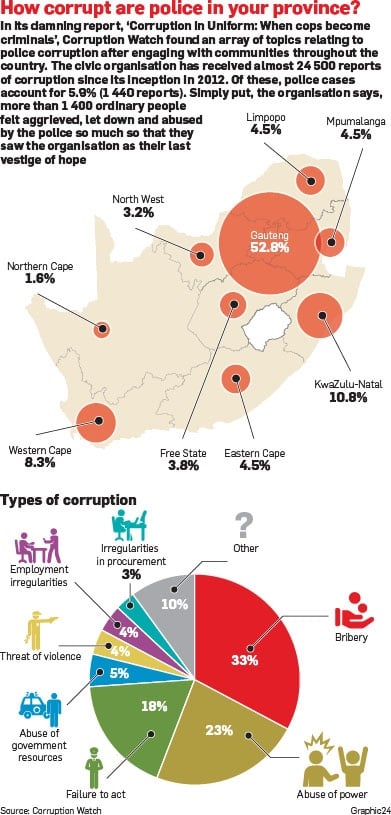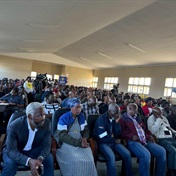Nicole Dlamini* was locked up in a holding cell and harassed by a police officer when she went to the station to report her abusive lover.
Her sin was that the officer, who interrogated and detained her, was a former school buddy of her lover.
Dlamini had gone to a Gauteng police station as the last resort after having suffered another night of abuse.
Her case was among 1 440 reports highlighting abuse of power, bribery and dereliction of duty within the police reported by locals to Corruption Watch since 2012.
In a similar case, a woman told researchers that police in her area “act as mortuary vans because they only respond when an abused woman is deceased”.
These cases formed part of a damning report, Corruption in Uniform: When cops become criminals, which was released by Corruption Watch last week.
According to the report, Gauteng recorded the highest number of cases.
Researchers revealed that this was due to population density and access to technology, which made reporting easy.
Most Gauteng cases, researchers found, were recorded in the townships.
The province’s two metros – Johannesburg and Tshwane – recorded 31.2% and 8.5%, respectively. Ekurhuleni came in at 6.2%.
In the country’s other big metros eThekwini recorded 7.9% and Cape Town 7%.
The highest number of recorded cases relating to dereliction of duty (where police failed to act) involved detectives and investigating officers, who came in at 26% for missing dockets or not doing anything in the reported case.
Station commissioners came in at 15%, which researchers linked to abuse of power with captains 12%, constables 10% and sergeants and warrant officers 8%.
Dlamini’s abuse had been going on for a very long time and she was traumatised.
She had tried everything – talking to her lover to control his anger and to seek help; asking family members to intervene; and talking to councillors and community leaders who provide support for survivors.
She even had the address of a safety shelter, in case she needed to make a get-away.
But, because of the fear of what her lover might do if she did, she opted to stay.
But on that fateful Saturday night, the abuse reached a tipping point.
“Things spiralled out of control. I was so afraid for my life. The cuts and bruises were so severe that I felt the only hope is to go to the nearest police station to report the crime,” Dlamini said.
However, on arrival at the police station, she felt the police officer on duty grilled her as if she was lying about the abuse.
She asked for a female officer to be called in – to no avail.
The officer attending to her instead told her that her lover was his buddy at school and asked if she had cheated on him.
“When I showed him my face, arms, the bruises and evidence of physical violence even then he seemed to doubt my words, asking inappropriate questions,” she said.
These included whether she was “sure if this was done by John?” or “this doesn’t seem like John, maybe you’ve been cheating on him”.
She was told she would be kept in a holding cell because her lover had filed a case opposing hers.
“Then he asked to see the other marks on my body just to be sure saying ‘You know that I can authorise a body search. No-one can stop me’,” she said.
She could not stop shaking and crying.
This line of questioning made her feel unsafe.
Researcher Melusi Ncala said they received cases from all over the country, from people of all ages, races, social and economic status, and gender.
“Though not enumerated in percentage, women were generally the people who blew the whistle on corruption,” Ncala said.
He said the Corruption Watch was in continuous dialogue with police structures.
These included the anti-corruption forum and Independent Police Investigative Directorate (Ipid).
“We do refer some whistle-blowers. We have put others in touch with Ipid for instance. The cases are still being investigated further,” Ncala said.
Police Minister Bheki Cele, Ncala said, has taken note of their report and has agreed to meet with the organisation to discuss possible ways to bring about change within the police.
*Not her real name




 Publications
Publications
 Partners
Partners









